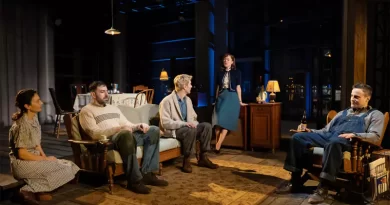“Never Let Me Go” at Bristol Old Vic
Simon Thomas in South West England
8 November 2024
Written by one of the finest of contemporary novelists, Kazuo Ishiguro’s Never Let Me Go was released as a book in 2005 and a film in 2010 starring Carey Mulligan, Keira Knightley, and Andrew Garfield. This stage version, a collaboration between Bristol Old Vic and theatres in Kingston, Malvern, and Northampton which are hosting the production on a short tour, is as haunting as the previous incarnations of the story. It tells a disturbing tale of a subtle dystopia that, like any good piece of fiction, works on a number of levels.

Photo credit: Hugo Glendinning.
As science fiction it is a chilling story of cloned youth, whose true purpose is only slowly revealed. At the specialized school of Hailsham where children are cultivated from birth as organ donors to serve the needs of wider society, we see a community of what seems at first to be perfectly ordinary young people. Our awareness of their situation grows along with theirs, as they learn gradually who they are and what their prescribed course is. Their organs will be harvested until their bodies give up, ending in often premature death and no hope of a long life or happiness.
The story could also be seen as an allegory of all our lives, as we face exploitation by a faceless society and an inevitable end that will, for many of us at least, be untimely and thoroughly daunting. Ishiguro weaves in themes of otherness, how anyone different has even their basic humanity brought into question. We see little of the outside world but encounters with “ordinary” people reveal suspicion and revulsion towards the cloned youngsters. Even those doomed contemporaries who have not been through the education of Hailsham but have taken a different route to a shared fate see their privileged peers as different from them. On a universal level, we all have to face physical decline and a gradual erosion of our bodies and minds. We may not be harvested in the way the youth in Ishiguro’s story are but life plucks away at us until “completion” (his euphemism for death) is achieved.
That may sound unrelentingly grim but Never Let Me Go is a gentle, almost elegiac, meditation on these themes. It is ultimately profoundly moving. Christopher Haydon’s masterful direction modulates the intense mood of each scene and the various locations and times flow effortlessly in Suzanne Heathcote’s skilful adaptation. Tom Piper’s adaptable set enables quick and slick scene changes between hospitals, school rooms, and even a panoramic seascape, a hint of a world outside the young people’s claustrophobic and predetermined lives.
The back story of the children’s cultivation at the prestigious school Hailsham is told through flashback with a fracturing of time that covers some 20 years overall. There is real chemistry between the main trio, a love triangle that begins in early adolescence and runs through to the characters’ early 30s. Nell Barlow’s Kathy H, whose long-time role as carer delays her own inevitable fate, is a performance of studied complexity as she holds the stage for the entire evening, dipping between active participation and reflective narration. Her scenes with Matilda Bailes’ Ruth zing with tension and rivalry but also an unspoken love that sees Kathy caring unselfishly for an irascible Ruth in her final days. Bailes carries off the tricky task of balancing a self-interested cattiness with sympathy for her tragic plight. Angus Imrie’s gawky Tommy, subject to explosive bouts of temper, is torn between the demands of the two women and his own feelings. There is a genuine anguish in his realization of their true dilemma, which excludes any hope of reprieve.
Although these three actors ultimately dominate the story they are part of a tight ensemble that includes strong performances by Amelie Abbott, Princess Khumalo, and Emilie Patry as a range of young victims and disturbed teachers. Maximus Evans, Susan Aderin, and Tristan Waterson also make telling contributions. There’s an atmospheric soundtrack by composer Eamonn O’Dwyer and the vocals for the fictional singer Judy Bridgewater are hauntingly realized by Marisha Wallace.









